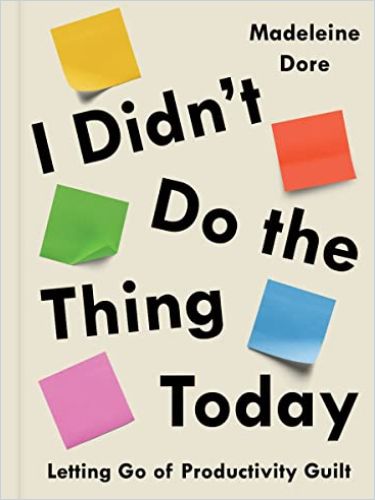Nobody gets everything done. Extraordinary Routines blogger Madeleine Dore draws on hundreds of interviews with artists, entrepreneurs and other creatives to delve into the reasons – and explains why you shouldn’t even try.

Not Getting Things Done
When writer and blogger Madeleine Dore launched her Extraordinary Routines project in 2014, she aimed to discover how successful people manage to be, well, so successful. Over the subsequent five years, she interviewed hundreds of high achievers about their secrets for accomplishing exceptional things.
The project led her to a stunning realization: Productivity isn’t a worthy goal. How well you love, learn and roll with the punches is a better measure of a life well lived than how much you accomplish. This insight inspired Dore’s book, I Didn’t Do the Thing Today, which deconstructs the productivity myth while offering a fresh outlook on achievement.
Feeling Undone
Where a more typical “success” guide would offer techniques and motivation for higher performance, Dore critiques the pursuit itself. She assails the prevailing assumption that productivity should serve as a metric for an individual’s value. When the growth rate of your to-do list outpaces your ability to check off every item, it causes you to feel anxious, guilty and incompetent – especially when other people seem to be perfect models of efficiency.
An overworked lifestyle has become a status symbol: We conflate being busy with being important because society has taught us to.Madeleine Dore
Viewing your day through a productivity lens, Dore says, can cause you to miss the richness and vibrancy life has to offer, and it leaves little time for generosity and kindness. In the relentless quest to accomplish more, you fail to notice those around you or to act thoughtfully when it matters. Taking time to listen to a friend in need, for example, says more about your character than a completed to-do list ever could.
Ebb and Flow
A personal productivity goal limits your day to achieving just one kind of success, Dore says. Instead, she advises holding a creativity goal, which widens your definition of a good day, allowing for natural fluctuations. A creative outlook alleviates the guilt associated with incomplete tasks and alters your perception of what qualifies as a worthwhile use of time. For example, waiting in line at the bank becomes a welcome opportunity for reflection instead of an unwanted interruption of productivity.
Creativity can be the antidote to the anxiety, guilt and shame we can encounter because it responds to what arises in our day rather than prescribes it.Madeleine Dore
Creativity isn’t limited to artists, Dore assures readers; it applies to anyone who engages fully in life. She encourages people to change their perspective by considering themselves a “day artist” – someone who embraces and experiments with what each moment has to offer, whether it’s messy, chaotic, unexpected or dull. When life is an artistic adventure, she says, mistakes, setbacks and detours become part of the untidy yet joyous process of living.
Wobble and Splodge
Dore offers fresh perspectives on routines, balance, drive and time – often in direct contradiction to the exhortations of productivity culture. Routines, she grants, can provide a sense of security and a welcome break from relentless decision-making. But the flip sides of a perfect routine are monotony, predictability and a dearth of the delightful interruptions that can enhance your day if you welcome them. Dore recommends, instead, optimizing your day in what designer Jenny Kee calls a “higgledy-piggledy” fashion. Leave yourself open to the vagaries of daily life, and shift your focus from a list of specific goals to the range of possibilities available on any given day.
Instead of seeking elusive balance, Dore encourages “wobble”: Picture yourself careening between the activities that require effort and focus. When you wobble, you make constant adjustments as life comes at you, remaining upright via grounding activities, such as a morning run, an afternoon cup of tea or bedtime stories. The wobble is a daily readjustment, she says; balance emerges over time.
There is an ebb and flow to our days, and not some perfectly aligned middle point we must find and maintain.Madeleine Dore
And stop thinking of time as money, Dore pleads. People aren’t designed to maximize every minute. Downtime – time spent resting, relaxing or even feeling stuck – has value, too. Worthwhile endeavors often take a long time and progress at their own pace, she points out. Optimizing every moment isn’t a realistic goal, but you can increase your capacity to let events unfold at their own pace. To that end, she suggests embracing what author Robert Dessaix calls a “splodge”: an amorphous “puddle” or “pool” of time. Thus, if you find yourself with five minutes’ spare time, get started on a project rather than waiting for the perfect amount of time to devote to it.
Replace your ambition with drive, Dore says. Ambition is a quest for achievement that brings external validation; drive comes from an internal desire to give your best effort. Drive doesn’t disappear when you finish a project or achieve success; instead, it draws you toward new heights. By separating drive from ambition, Dore promises, you can untangle your worth from your job title, accomplishments or successes.
Rest and Joy
According to Dore, the world is suffering from an epidemic of busyness. Some busyness is unavoidable, she grants, such as the need to work two or more jobs to make ends meet. But societal pressure to produce continuously lures many people to jump voluntarily onto the busyness treadmill. The unrelenting pace works against productivity and can cause burnout. A packed schedule prevents many people from ever considering what they really want.
As an antidote to the busyness compulsion, Dore prescribes rest and boredom: These states are necessary for your physical and mental health, she says. And rest will replenish your power to produce.
Rather than dismissing the days that didn’t meet our expectations, perhaps it’s the unrealistic shoulds and the onerous obligations that we need to strike.Madeleine Dore
Sheer will and determination can and do bring success to some people, Dore admits. But she views that kind of discipline as a cruel way to impose rule and order on an imperfect environment. She contrasts this harsh approach with the concept of “delightful discipline,” or drawing motivation from the joy of learning and a commitment to a process. With delightful discipline, you commit to achieving an objective over time, working as your energy allows and accommodating life’s unpredictable swings.
Dore’s refreshing treatise offers abundant encouragement to abandon the quest for better time-management techniques and instead embrace the stumbles, side adventures and messiness that prevent you from doing “the thing” today.






